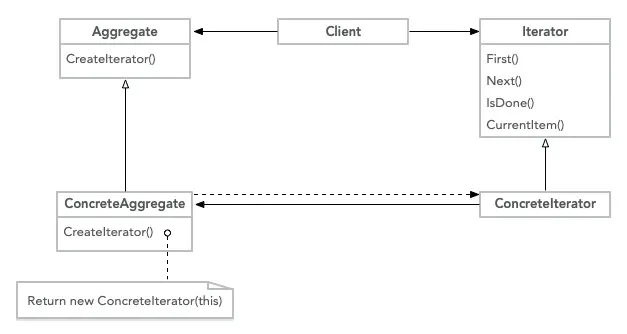A brief discussion of the iterator pattern in PHP
In the previous article "In-depth analysis of the observer pattern in PHP" we introduced the observer pattern in PHP. The following article will take you to understand the iterator pattern in PHP.

When talking about this pattern, we have to mention loop statements. In "Dahua Design Pattern", the author said that the learning significance of this model is now greater than the practical significance. Why is this? Of course, it was because of foreach. Any language has this kind of similar syntax that can quickly and easily traverse arrays and objects, thus allowing the iterator pattern to slowly become a passer-by from the star among the 23 major design patterns. Especially our PHP language, the power of PHP lies in its flexible operation of arrays. It is a hashmap structure. Naturally, there are various convenient array operation syntaxes, and foreach is also our most commonly used statement, even better than for. Also commonly used.
Gof class diagram and explanation
GoF definition: Provides a method to sequentially access each element in an aggregate object without exposing it The internal representation of the object
GoF class diagram

##Code implementation
1 2 3 4 5 6 7 8 9 10 11 12 13 14 15 16 17 18 |
|
1 2 3 4 5 6 7 8 9 10 11 12 13 14 15 16 17 18 19 20 21 22 23 24 25 26 27 28 29 30 31 32 33 34 35 36 37 |
|
cursor mode.
1 2 3 4 5 6 7 |
|
- Everyone must be curious, why is our iterator interface class not named Iterator? Try it and you will know that PHP has prepared this interface for us. After implementing it, you can use foreach to use this class that implements the Iterator interface. Isn't it very advanced? Let's finally look at the use of this class. Didn’t you agree to traverse the class? Why pass an array back and forth? Students who have developed Java must know that in a JavaBean named Object class, a variable of List type, such as List myList, is written to represent the current collection of objects. After adding data to this List during use, you can directly use Object.myList to obtain a set of data next time. For example, the json array content obtained from the interface can be stored in a Bean. At this time, we can use an iterator to operate only on the array inside our own object! The above Java content is actually what the author often uses when doing Android development. Sometimes the JavaBean of the database will also have this kind of array to store foreign keys. But it is generally rarely used in PHP, because most AR objects in PHP are slightly different from the Bean concept in Java. Interested students can learn more!
Our mobile phone factory is amazing. It has assembled a production line by itself. What is this production line mainly used for? We have handed over the molding machine to Foxconn, and our line is for painting mobile phones. When we put all the delivered mobile phones (Aggregate) into different production lines (Iterator), they will help us paint the color of the current production line one by one. Isn’t it very powerful! ! Technology is not just about changing shells. If this line is still there, we can do other things, such as adding some lanyards. Anyway, as long as I can pass one by one, I can put things on. Do you think it will work? Easy to use! !
Full code: https://github.com/zhangyue0503/designpatterns-php/blob/master/07.iterator/source/iterator.php
实例
实例还是围绕着我们的短信发送来看。这一次,我们的业务需求是尽快的发一批通知短信给用户,因为活动的时候可不等人啊。在之前我们会使用多个脚本来把用户手机号分成多组来进行发送。现在我们可以用swoole来直接多线程的发送。所要达到的效果其实就是为了快速的把成百上千的短信发完。这个时候我们也会做一些策略,比如数据库里是100条要送的短信,有个字段是发送状态,一个线程正序的发,一个线程倒序的发,当正序和倒序都发送到50条的时候其实已经同步的发完这100条了,不过也有可能会有失败的情况出现,这时,两个线程还会继续去发送那些上次发送不成功的信息,这样能够最大程度的确保发送的效率和到达率。
消息发送迭代器类图

完整源码:https://github.com/zhangyue0503/designpatterns-php/blob/master/07.iterator/source/iterator-msg.php
1 2 3 4 5 6 7 8 9 10 11 12 13 14 15 16 17 18 19 20 21 22 23 24 25 26 27 28 29 30 31 32 33 34 35 36 37 38 39 40 41 42 43 44 45 46 47 48 49 50 51 52 53 54 55 56 57 58 59 60 61 62 63 64 65 66 67 68 69 70 71 72 73 74 75 76 77 78 79 80 81 82 83 84 85 86 87 88 89 90 91 92 93 94 95 96 97 98 99 100 101 102 103 104 105 106 107 108 109 110 111 112 113 114 115 116 117 118 119 120 121 122 |
|
说明
- 其实就是两个迭代器,一个是正序一个是倒序,然后遍历数组
- 例子中我们还是对一个数组的操作,另外用两个类似于工厂方法模式的类来对迭代器进行封装
- 例子非常简单,但有时候这种用法也非常实用,比如一些搜索引擎排名的爬虫,多次确认某些关键词的排名,这时候我们就可以正着、反着来回进行验证
完整源码:https://github.com/zhangyue0503/designpatterns-php/blob/master/06.observer/source/spl_observer.php
彩蛋
PHP中的Iterator接口已经为我们准备好了一套标准的Iterator模式的实现,而且(这里需要画重点),实现这个接口的类可以用foreach来遍历哦!
文档:https://www.php.net/manual/zh/class.iterator.php
源码:https://github.com/zhangyue0503/designpatterns-php/blob/master/07.iterator/source/iterator-php.php
文档中相关的接口都可以看看,更重要的是,PHP的SPL扩展中,也为我们准备了很多常用的迭代器封装。要知道,面试的时候要是能说出这里面的几个来,那面试官可是也会刮目相看的哦!
SPL迭代器:https://www.php.net/manual/zh/spl.iterators.php
本文转载自:https://juejin.cn/post/6844903937921777671
作者:硬核项目经理
推荐学习:《PHP视频教程》
The above is the detailed content of A brief discussion of the iterator pattern in PHP. For more information, please follow other related articles on the PHP Chinese website!

Hot AI Tools

Undresser.AI Undress
AI-powered app for creating realistic nude photos

AI Clothes Remover
Online AI tool for removing clothes from photos.

Undress AI Tool
Undress images for free

Clothoff.io
AI clothes remover

Video Face Swap
Swap faces in any video effortlessly with our completely free AI face swap tool!

Hot Article

Hot Tools

Notepad++7.3.1
Easy-to-use and free code editor

SublimeText3 Chinese version
Chinese version, very easy to use

Zend Studio 13.0.1
Powerful PHP integrated development environment

Dreamweaver CS6
Visual web development tools

SublimeText3 Mac version
God-level code editing software (SublimeText3)

Hot Topics
 1677
1677
 14
14
 1430
1430
 52
52
 1333
1333
 25
25
 1278
1278
 29
29
 1257
1257
 24
24
 PHP and Python: Different Paradigms Explained
Apr 18, 2025 am 12:26 AM
PHP and Python: Different Paradigms Explained
Apr 18, 2025 am 12:26 AM
PHP is mainly procedural programming, but also supports object-oriented programming (OOP); Python supports a variety of paradigms, including OOP, functional and procedural programming. PHP is suitable for web development, and Python is suitable for a variety of applications such as data analysis and machine learning.
 PHP's Purpose: Building Dynamic Websites
Apr 15, 2025 am 12:18 AM
PHP's Purpose: Building Dynamic Websites
Apr 15, 2025 am 12:18 AM
PHP is used to build dynamic websites, and its core functions include: 1. Generate dynamic content and generate web pages in real time by connecting with the database; 2. Process user interaction and form submissions, verify inputs and respond to operations; 3. Manage sessions and user authentication to provide a personalized experience; 4. Optimize performance and follow best practices to improve website efficiency and security.
 Choosing Between PHP and Python: A Guide
Apr 18, 2025 am 12:24 AM
Choosing Between PHP and Python: A Guide
Apr 18, 2025 am 12:24 AM
PHP is suitable for web development and rapid prototyping, and Python is suitable for data science and machine learning. 1.PHP is used for dynamic web development, with simple syntax and suitable for rapid development. 2. Python has concise syntax, is suitable for multiple fields, and has a strong library ecosystem.
 PHP and Python: A Deep Dive into Their History
Apr 18, 2025 am 12:25 AM
PHP and Python: A Deep Dive into Their History
Apr 18, 2025 am 12:25 AM
PHP originated in 1994 and was developed by RasmusLerdorf. It was originally used to track website visitors and gradually evolved into a server-side scripting language and was widely used in web development. Python was developed by Guidovan Rossum in the late 1980s and was first released in 1991. It emphasizes code readability and simplicity, and is suitable for scientific computing, data analysis and other fields.
 Why Use PHP? Advantages and Benefits Explained
Apr 16, 2025 am 12:16 AM
Why Use PHP? Advantages and Benefits Explained
Apr 16, 2025 am 12:16 AM
The core benefits of PHP include ease of learning, strong web development support, rich libraries and frameworks, high performance and scalability, cross-platform compatibility, and cost-effectiveness. 1) Easy to learn and use, suitable for beginners; 2) Good integration with web servers and supports multiple databases; 3) Have powerful frameworks such as Laravel; 4) High performance can be achieved through optimization; 5) Support multiple operating systems; 6) Open source to reduce development costs.
 PHP's Impact: Web Development and Beyond
Apr 18, 2025 am 12:10 AM
PHP's Impact: Web Development and Beyond
Apr 18, 2025 am 12:10 AM
PHPhassignificantlyimpactedwebdevelopmentandextendsbeyondit.1)ItpowersmajorplatformslikeWordPressandexcelsindatabaseinteractions.2)PHP'sadaptabilityallowsittoscaleforlargeapplicationsusingframeworkslikeLaravel.3)Beyondweb,PHPisusedincommand-linescrip
 PHP vs. Python: Use Cases and Applications
Apr 17, 2025 am 12:23 AM
PHP vs. Python: Use Cases and Applications
Apr 17, 2025 am 12:23 AM
PHP is suitable for web development and content management systems, and Python is suitable for data science, machine learning and automation scripts. 1.PHP performs well in building fast and scalable websites and applications and is commonly used in CMS such as WordPress. 2. Python has performed outstandingly in the fields of data science and machine learning, with rich libraries such as NumPy and TensorFlow.
 The Continued Use of PHP: Reasons for Its Endurance
Apr 19, 2025 am 12:23 AM
The Continued Use of PHP: Reasons for Its Endurance
Apr 19, 2025 am 12:23 AM
What’s still popular is the ease of use, flexibility and a strong ecosystem. 1) Ease of use and simple syntax make it the first choice for beginners. 2) Closely integrated with web development, excellent interaction with HTTP requests and database. 3) The huge ecosystem provides a wealth of tools and libraries. 4) Active community and open source nature adapts them to new needs and technology trends.




